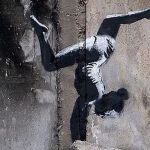Coalition forces have suffered minor injuries during drone attacks at US bases in Iraq, as regional tensions escalate following the deadly explosion at a hospital in Gaza.
Two drones targeted the al Asad airbase in western Iraq, while another drone attacked a base in northern Iraq, a US official told the Associated Press.
US forces successfully intercepted all three drones, managing to destroy two of them. However, the third drone was only damaged, which led to minor injuries among coalition forces stationed at the western base.
Israel-Gaza latest: Conflict will become regional, warns Russia
Please use Chrome browser for a more accessible video player
The incident was confirmed in a statement released by US Central Command on Wednesday, highlighting the ongoing challenges faced by coalition troops in the region.
“In this moment of heightened alert, we are vigilantly monitoring the situation in Iraq and the region. US forces will defend US and coalition forces against any threat,” it said.
The Islamic Resistance in Iraq, a coalition of these militias, claimed responsibility for the recent attacks, vowing “more operations” against the “American occupation”.
It comes amid escalating tensions and concerns about a broader regional conflict as a result of the Israel-Hamas war.
While Hezbollah, a Hamas ally in Lebanon, has engaged in limited border strikes with Israel – Iraqi militias, with Iranian support, have issued threats to attack US facilities in response to America’s backing of Israel.
“Our missiles, drones and special forces are ready to direct qualitative strikes at the American enemy in its bases and disrupt its interests if it intervenes in this battle,” Ahmad “Abu Hussein” al Hamidawi, head of the Kataib Hezbollah militia, said last Wednesday. He also threatened to launch missiles at Israeli targets.
Following the explosion at the al Ahli al Arabi hospital in Gaza City on Tuesday night, resulting in hundreds of casualties, the group attributed the catastrophe to the US and its support for Israel.
In a separate statement, it called for an end to the US presence in Iraq.
Hamas called the hospital explosion a “crime of genocide” and has blamed it on Israel.
Israel has denied any involvement and said the blast was caused by a misfired rocket launched by the Palestinian Islamic Jihad (PIJ) group – an Islamist militant group based in Gaza which is smaller than Hamas but shares a similar ideology.
US officials investigating the explosion say information gathered so far indicates Israel was “not responsible” for the blast.
Two senior American officials told NBC News – the US partner of Sky News – that the US had assessed that a PIJ group had misfired a rocket and it hit the hospital.
Be the first to get Breaking News
Install the Sky News app for free
Read more:
‘The UK stands with you’, Sunak arrives for talks in Israel
What we know about the Gaza hospital explosion
Meanwhile, Tashkil al Waritheen, an Iranian-backed militia group, claimed responsibility for a second drone attack targeting the al Harir airbase in northern Iraq. US officials have not commented on the claim of the second attack.
The government of the semi-autonomous Kurdish region in northern Iraq said an intercepted drone crashed in an open area near the village of Batas.
Iranian-backed militia officials confirmed the attacks and said they were prepared to join the wider battler against Israel, but added they were awaiting Iran’s approval to open a new front. Leaders from some of these factions are said to be in Lebanon and Syria, ready to act if ordered.
The US Embassy in Baghdad declined to comment.
Analysts have suggested Iraqi groups allied with Iran and Hamas might open a new front if the Hamas-Israel conflict escalates or becomes protracted.
“Geographically, obviously, they are several steps removed, so they’re not going to be the first to react” and are likely to serve in a supporting role, said Lahib Higel, a senior analyst for Iraq at the International Crisis Group.
Renad Mansour, a senior research fellow at Chatham House, explained Iran-backed groups in Iraq are divided into political parties with interests in Iraq’s political system and “vanguard” militant groups tightly controlled by Iran.
He noted the latter have previously been deployed as ground forces in regional conflicts, such as in Yemen and Syria.
“This is what they’re designed to do,” Mr Mansour said.
“The question is more, will Iran and some of the leaders of these groups decide it’s in their interest to escalate?”






















